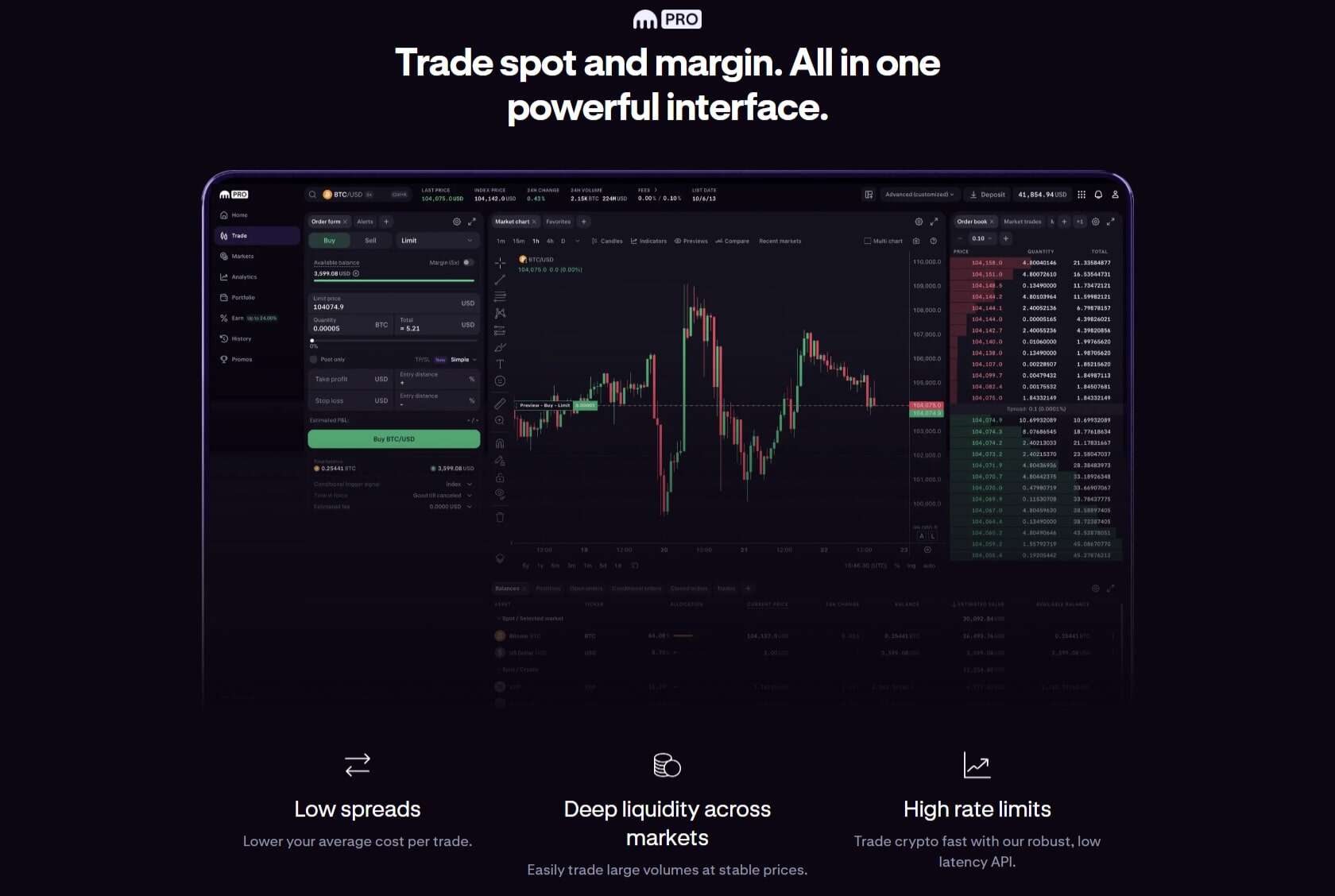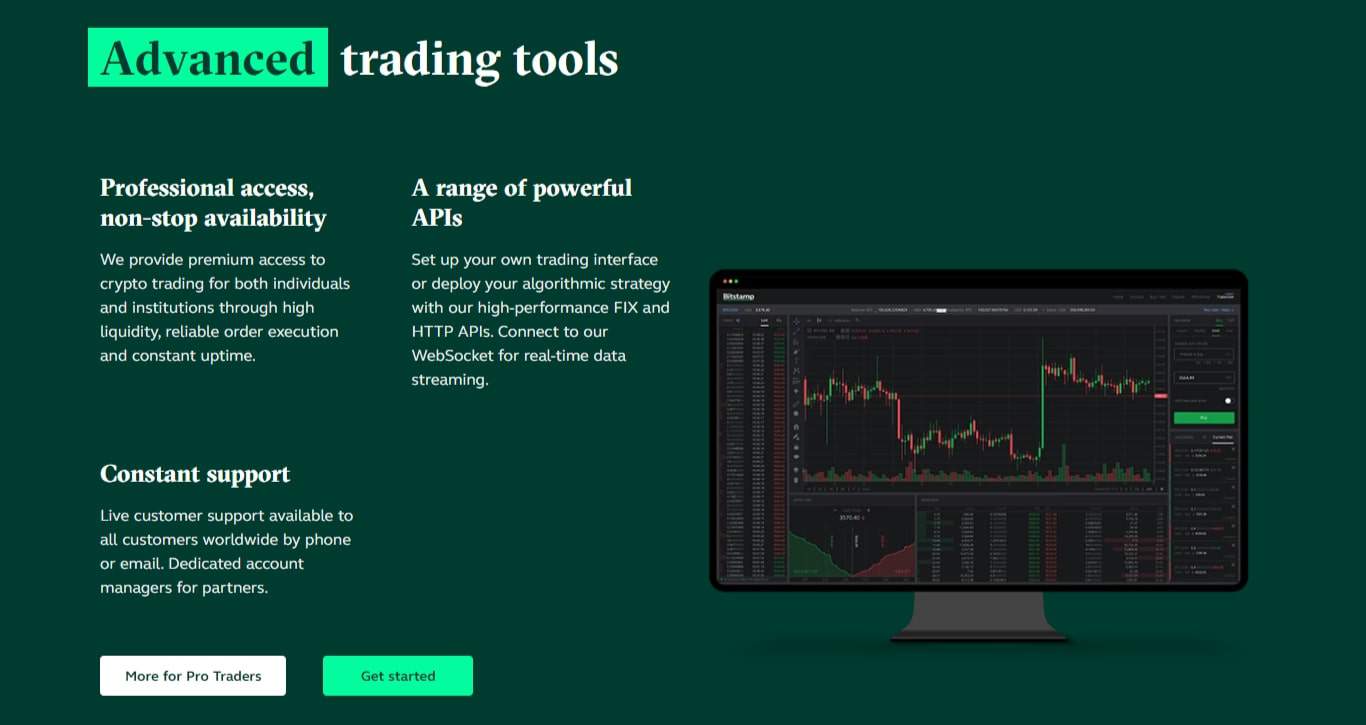When it comes to navigating the dynamic world of cryptocurrency exchanges, making an informed decision is crucial. Today, we’re comparing two stalwarts in the digital currency platforms: Kraken and Bitstamp.
Both have carved out significant market share and have catered to crypto traders across the globe with a range of services and features. This comparison will delve into the nuances of what each exchange offers, aiming to highlight the unique selling points that may resonate with different types of users.
At a glance
| Category | Kraken Our review is based on the spot trading platform. Please check our methodology on how we rate exchanges for further information. | Bitstamp Our review is based on the spot trading platform. Please check our methodology on how we rate exchanges for further information. |
|---|---|---|
| Headquarters Location | International | International |
| Fiat Currencies Supported | USD, AUD, GBP, CAD, EUR + 1 other | USD, GBP, EUR |
| Total Supported Cryptocurrencies | 438+ | 102+ |
| Trading Fees | 0.08% - 0.40% | 0.060%% - 0.160% |
| Deposit Methods | Bank Transfer, Debit Card, Credit Card, Cryptocurrency, Paypal, Apple Pay, Google Pay, PayID, Osko | Bank Transfer, Debit Card, Credit Card, Cryptocurrency, Paypal, Apple Pay, Google Pay |
| Support | Facebook, Twitter, Instagram, Live Chat, Help Center Articles, Support Ticket | Facebook, Twitter, Instagram, Live Chat, Help Center Articles, Support Ticket |
| Mobile App | Yes - iOS, Android | Yes - iOS, Android |
| Our Rating | ||
| Review | Read full Kraken review | Read full Bitstamp review |
| Visit | Visit Kraken
Don’t invest unless you’re prepared to lose all the money you invest. This is a high-risk investment and you should not expect to be protected if something goes wrong. Take 2 mins to learn more. |
Visit Bitstamp |
About Kraken Our review is based on the spot trading platform. Please check our methodology on how we rate exchanges for further information.
Kraken, based in San Francisco, stands as a leading cryptocurrency exchange known for its extensive range of cryptocurrencies and advanced trading options. Founded in 2011 by Jesse Powell, Kraken has grown to become a favourite amongst experienced traders, offering a blend of cutting-edge features including margin trading.
Its dedication to high-tech security measures and a user-friendly experience has solidified its position as a dependable platform for both retail and institutional traders. The inception of Kraken can be traced back to the aftermath of the Mt. Gox hack, which underscored the importance of security in the digital currency space.

This catalytic event shaped Kraken’s philosophy, anchoring its development in robust security measures and a transparent approach. Over the years, the platform has adapted to market shifts, integrating advanced trading features that cater to a dynamic user base, from casual crypto enthusiasts to professional traders seeking sophisticated instruments.
Kraken Pros & Cons
Pros
Cons
Don’t invest unless you’re prepared to lose all the money you invest. This is a high-risk investment and you should not expect to be protected if something goes wrong. Take 2 mins to learn more.
About Bitstamp Our review is based on the spot trading platform. Please check our methodology on how we rate exchanges for further information.
Please note: On June 2, 2025, Robinhood officially acquired Bitstamp for $200 million. This marks a new chapter for Bitstamp, one of the longest-standing crypto exchanges in the world. The deal brings Bitstamp under the Robinhood umbrella, expanding its crypto services across Europe, the UK, and Asia. While the core features of Bitstamp remain unchanged for now, integration with Robinhood’s systems is underway - so users may notice gradual updates in platform functionality over time.
Bitstamp, on the other hand, holds the title of being one of the longest-running digital currency platforms. Established in 2011 by Nejc Kodrič and Damian Merlak in Slovenia, and now based in Luxembourg, Bitstamp has a legacy that speaks to reliability and a straightforward trading experience.
Known for its emphasis on security and compliance, Bitstamp caters to a wide audience from fiat currency traders to crypto enthusiasts, all looking to engage with the crypto market. Bitstamp’s journey has been marked by its early commitment to regulatory compliance, setting it apart in an industry that has often grappled with legal ambiguities. This forward-thinking approach ensured Bitstamp’s longevity and trust among users who prioritise a secure, regulated trading environment.

With expansions into new markets, including a strategic move to Luxembourg to benefit from its progressive crypto legislation, Bitstamp has maintained its relevance amidst evolving market trends and the emergence of new digital assets.
Bitstamp Pros & Cons
Pros
Cons
Kraken vs Bitstamp: Supported Cryptocurrencies
In terms of total cryptocurrencies available, Kraken users have access to more cryptocurrencies. Kraken offers 438 cryptocurrencies whereas Bitstamp supports 102 cryptocurrencies.
For those interested in trading high market cap cryptocurrencies, Kraken supports 23 of the top 30, compared to Bitstamp which supports 20 of the top 30.
Kraken supports a significantly higher number of cryptocurrencies compared to Bitstamp. With this in mind, Kraken definitely has the edge for people looking to trade a wider range of cryptocurrencies.
Kraken vs Bitstamp: Fees
| Fee Type | Kraken Fees | Bitstamp Fees |
|---|---|---|
| Deposit Fee (Bank Transfer) | $0 USD - $5 USD | 0% - 0.05% |
| Deposit Fee (Credit Card/Debit Card) | Not Listed | 0% |
| Trading Fee | 0.08% - 0.40% | 0.060%% - 0.160% |
| Withdrawal Fee (Bank Transfer) | $0 USD - $35 USD | €0 EUR - €3 EUR |
Both Kraken and Bitstamp are known for their competitive fee structures. Kraken’s fees are designed to benefit frequent traders with volume-based discounts, while Bitstamp offers a simplified, flat-rate schedule that may appeal to users who favour transparency and simplicity.
Neither platform aims to be the cheapest, but rather they strive to balance fees with the quality of service offered. While navigating trading fees across various platforms can be complex, both Kraken and Bitstamp have structured their fee schedules to cater to distinct market segments. The cost of trading is a balancing act, reflecting the platforms’ investment in technology, customer service, and security infrastructure.
As the crypto market matures, these fee structures may evolve, but they will likely continue to reflect each platform’s commitment to combining competitive pricing with quality service.
Kraken vs Bitstamp: Security
Security is paramount in the cryptocurrency space, and both Kraken and Bitstamp have taken robust measures to ensure the safety of user funds. Kraken has never suffered a major hack and is recognized for its comprehensive security protocols.

Bitstamp, having learned from a security breach in 2015, has since implemented stringent security measures and operates with a high level of regulatory compliance, being licensed by the Luxembourg Financial Conduct Authority. Beyond their foundational security measures, Kraken and Bitstamp have both incorporated additional layers of protection to guard against the ever-present threat of cyber attacks. This includes not just technological defences but also procedural safeguards, such as rigorous staff training and incident response plans.
The security landscape is a game of constant vigilance and adaptation, with both platforms investing heavily in staying ahead of potential threats to safeguard their users’ assets.
Kraken vs Bitstamp: Ease of use
Ease of use is a critical factor when choosing an exchange. Kraken boasts a sophisticated trading platform that may appeal to seasoned traders, but it can be intimidating for newcomers.

Bitstamp offers a more streamlined and user-friendly interface that is well-suited for beginners, while still providing the tools needed for more experienced users to execute complex trades. The usability of an exchange can often be a decisive factor for users. While Kraken offers a multifaceted platform that supports a variety of order types and analysis tools, it also strives to maintain an accessible environment for newer users through educational resources.
Bitstamp’s minimalist design ensures a clutter-free and straightforward experience, facilitating quick acclimatisation for users of all experience levels without compromising the functional needs of more seasoned traders.
Kraken vs Bitstamp: Support
Effective customer service is crucial for any financial platform. Kraken and Bitstamp both offer support through various channels.

Kraken prides itself on providing comprehensive 24/7 customer service, ensuring that users can get help whenever they need it. Bitstamp also offers reliable customer support, with a focus on resolving issues promptly to maintain a smooth service for its users.
Each platform’s dedication to customer service reflects their commitment to providing a positive user experience. Both Kraken and Bitstamp recognise the critical role customer support plays in user retention and satisfaction. By offering expansive support networks, they demonstrate a commitment to user empowerment.
This includes providing a wealth of online resources and responsive support teams. The effectiveness of customer service in these exchanges is a testament to their understanding that timely assistance can significantly enhance the overall trading experience.
Kraken vs Bitstamp: Features
Kraken and Bitstamp both offer a variety of trading features designed to cater to their respective user bases. Kraken provides features such as conditional closes and margin trading, tailored towards traders who require a nuanced trading environment.

Bitstamp, whilst more limited in advanced features, still provides a solid trading experience with all the necessary tools for buying and selling cryptocurrencies effectively. Diving deeper into the trading experience, both exchanges showcase their unique perspectives on feature offerings. Kraken’s platform presents an array of advanced order types and trading tools, attracting users who require a more granular control over their trading strategies.
Bitstamp, although presenting a more modest feature set, ensures that users have access to a solid foundation for executing trades, thus maintaining a balance between simplicity and functionality.
Final Thoughts
In conclusion, the choice between Kraken and Bitstamp may come down to personal preferences in trading styles, desired features, and the importance placed on fees. Both exchanges offer a secure platform, with Kraken appealing to those seeking advanced trading tools and a wider range of cryptocurrencies, while Bitstamp is a strong choice for users who appreciate a platform that has stood the test of time with a focus on security and straightforward trading. The landscape of digital finance is ever-changing, with crypto exchanges at the forefront of innovation and adaptation.
Kraken and Bitstamp, each with their own strategic focus and core competencies, illustrate the diverse pathways exchanges can take in shaping the future of cryptocurrency trading. Their continued evolution will undoubtedly be influenced by user demand, regulatory shifts, and the overarching direction of the digital asset market.
Don’t invest unless you’re prepared to lose all the money you invest. This is a high-risk investment and you should not expect to be protected if something goes wrong. Take 2 mins to learn more.
Kraken vs Bitstamp: FAQs
Kraken is indeed a legitimate cryptocurrency exchange. It’s well-regarded in the crypto community for its security measures and has been operating since 2011, which is quite a long time in the fast-paced world of cryptocurrency.
Kraken is known for complying with various regulatory standards and offers a wide range of cryptocurrencies for trading.
Like any platform, it has its own set of features and policies that might suit different traders differently, but in terms of legitimacy and reliability, Kraken is generally held in high regard.
Kraken Disclaimer
Don’t invest unless you’re prepared to lose all the money you invest. This is a high-risk investment and you should not expect to be protected if something goes wrong. Take 2 mins to learn more.
Methodology
At Crypto Head we use a rigorous research and rating process to assess each platform. Our star rating system is out of 5 stars and is designed to condense a large amount of information into an easy-to-understand format. You can read our full methodology and rating system for more details.


